How Workplace Mental Health Coaching gave one organisation a competitive edge
When asked what led construction company Ryan Wilks to take up free Workplace Mental Health Coaching delivered by Transitioning Well, and funded by the NSW Government, Construction Manager Oliver Crome says four words: “The Code of Practice.”
Crome explains that while employee wellbeing had long been a priority and the company consistently valued the mental health of its team, the introduction of the Code of Practice provided an opportunity to strengthen and formalise their approach.
It enabled Ryan Wilks to align its existing initiatives with recognised best practice, supporting internal wellbeing efforts while also enhancing compliance for tender submissions and reinforcing client confidence in the company’s adherence to the Code.
“A few of our clients in the Telco industry started to use the terms that we’re now familiar with, such as psychosocial hazards and wellbeing, and asking to see policies around that,” Crome says.
Crome also acknowledges that the output from coaching has helped the business to retain existing clients by demonstrating better practice in psychosocial health and safety. “Clients see that we are not only accredited in our field, but that we are also doing a better job to create a more mentally healthy workplace.”
The benefits of professional support
Crome speaks positively about coach Anna Kijowska, and how she delivered the service.
“The depth of knowledge and support provided by our coach, Anna, along with the access to practical resources, was outstanding,” he says.
At the time when Crome began coaching, the Code of Practice for Managing psychosocial hazards at work was relatively new. “Anna’s ability to translate complex psychosocial concepts into clear, actionable steps tailored to our business was invaluable and exceeded our expectations.”
Crome acknowledges that while his organisation had few visible challenges relating to mental health and wellbeing, the coaching process revealed that managing psychosocial hazards required a new level of awareness and a tailored strategic approach beyond general WHS compliance.
“It’s a new way of thinking,” Crome says. “It’s different to managing physical safety on site, so we needed professional help. Anna gave us confidence in what we were doing.”
Anna’s guidance was tailored to suit the business operations and has been particularly valuable in helping the business with managing psychosocial hazards.
Embedding learnings
Two years into coaching and Crome lists all that the organisation has done while acknowledging, “The big picture has only just started for us”. While being guided by Anna the organisation has:
- Consulted with their people via the People at Work Survey, and gained feedback for implementation
- Embedded a structured, proactive psychosocial risk assessment process
- Introduced dedicated Toolbox Talks focused on psychological safety
- Updated key policies, such as Discrimination and Harassment Policy and Psychological Hazards in the Workplace Policy
- Effectively rolled out health and safety wellbeing processes.
Finally, Crome highlights how coaching helped create a dialogue about mental health and wellbeing internally.
“We’re actually talking about people’s wellbeing and how that affects them, their home life and everyone around them,” he says. “I think that’s very positive, especially in the construction industry, where you tend not to talk about your feelings too much.”
“The more we have these talks, the more we’ll bond, the more we’ll respect each other, the more we’ll respectfully treat each other.”
Crome shares that the organisation is still building morale and motivation after a period of uncertainty during COVID. “These kinds of talks help with that too,” he says. “They bring everyone together.”
Learn more about Workplace Mental Health Coaching here.
Oliver’s four key takeaways:
- Take the time to genuinely engage your team, the process is more impactful when everyone is involved.
- Don’t underestimate the value of external guidance, it helps uncover blind spots.
- Mental health and wellbeing strategies are essential to strong safety culture and business performance.
- The structured approach made implementation straightforward and sustainable.



